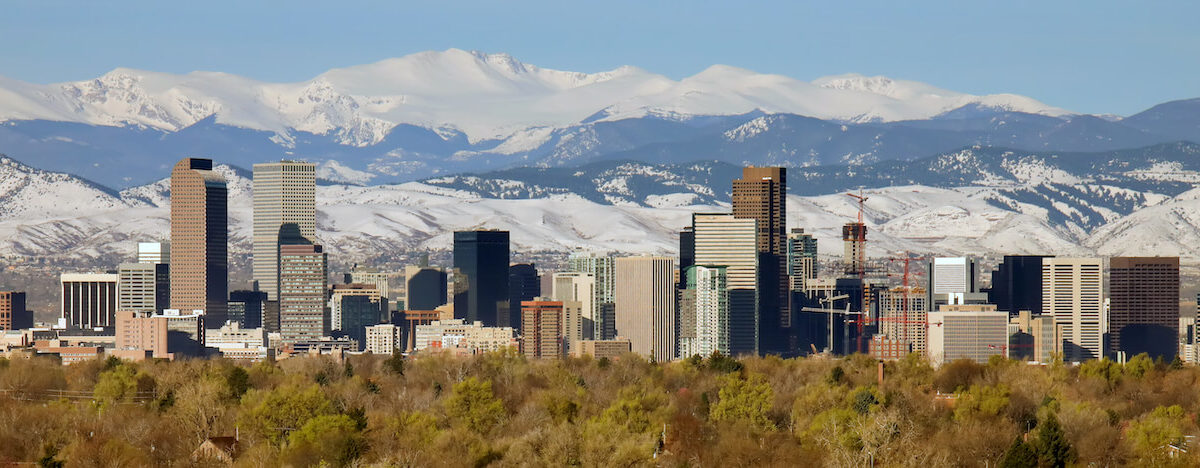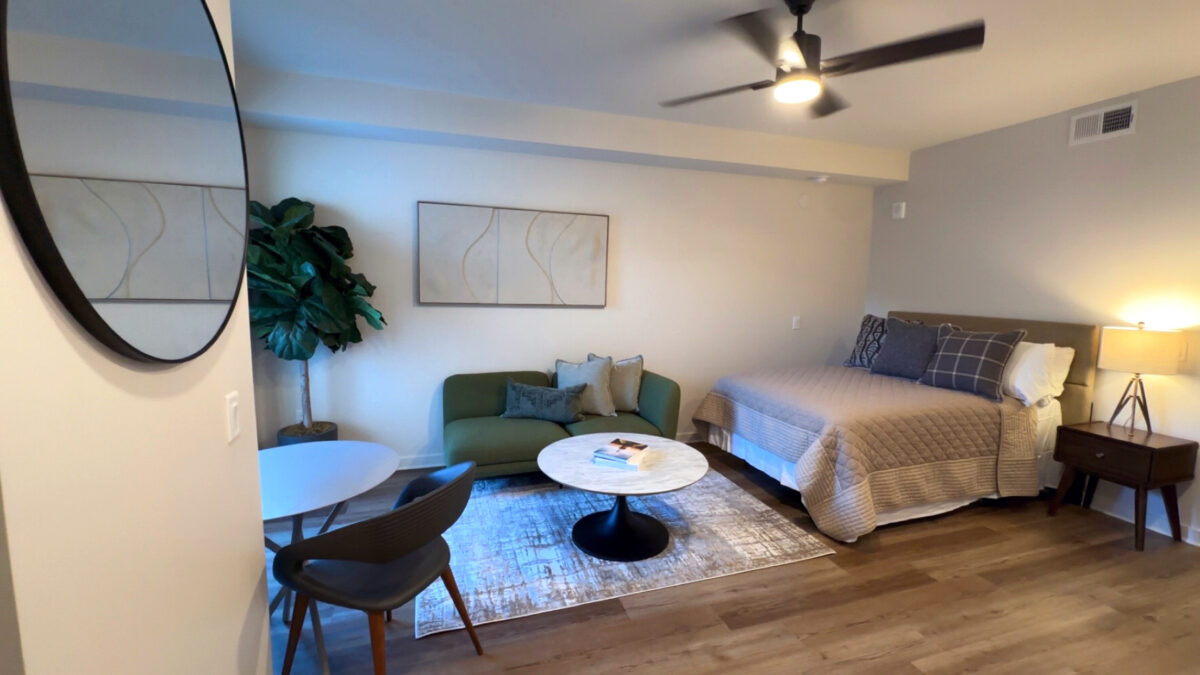Are the mountains calling your name? Do you dream of turning your yearly ski trip into an every weekend adventure? Are you looking for a mid-size city with plenty of personality? The Mile High City might be your new home. Whether you plan to downsize from New York to Denver or leave a small town for bigger opportunities, this guide will help you decide if Colorado is right.
Pros and Cons of Living in Colorado
If living in Denver is on your list of considerations, you’re probably wondering: Is Denver a good place to live? Here are some pros and cons of moving to Colorado.
Pro: Work-life balance.
Keep reading to learn about many people’s mountain lifestyle in Denver, but know that it’ll likely translate into your work. Many new residents are shocked to discover that “business casual” in the city often translates to an untucked flannel shirt and jeans.
You might spy benefits packages that offer discounted ski passes, climbing gym memberships, bike storage, dog-friendly offices, and even “powder days,” which are last-minute days off to hit the slopes for fresh snow. Don’t be surprised to hear coworkers taking advantage of hybrid schedules to work from their Sprinter van in the mountains or the 14er they climbed over the weekend.
Con: Smaller than other big cities.
In 2022, the population of Denver was a little over 713,000. While it’s hard to compare to New York City’s population of 8 million, even next to 979,000 people in Austin, Texas, it can seem small. Its size might be a good thing for some people, but for others, the smaller size could mean fewer opportunities.
Pro: Mountain lifestyle.
The beautiful Rocky Mountains grace Denver’s city skyline on a clear day. A quick drive down I-70 will take you into the heart of the mountains. Colorado is home to world-class skiing and snowboarding, hiking, mountain biking, climbing, and more. In fact, of the 96 mountains over 14,000 ft in elevation in the United States, Colorado has the most at 53. Denver living is the best of city life, with a mountain playground just a short distance away.
Con: City traffic.
On your drive to work, you may have a stunning Rocky Mountain view, but it doesn’t always cure road rage. According to a recent study, Denver has the 17th worst traffic congestion of the major US metropolitan areas. Additionally, the city traffic can leak out into the nearby mountains. During ski season, traffic down the main I-70 corridor from the city to the major resorts is known to come to a standstill as folks fight for first chair.
Pro: Arts, sports, and culture.
If you’re the type of person who wants to look at the mountains without necessarily climbing them, Denver still has plenty to offer for you. Denver has eight distinct arts districts, dozens of museums, and many musical performances. Just outside the city in Morrison, you’ll also find Red Rocks Amphitheatre, a legendary music venue that’s worth a visit even if you aren’t going to a show.
And if you’re more of a sports fan, Denver has you covered. Denver has professional sports for almost any taste:
- NFL: Denver Broncos
- NHL: Colorado Avalanche
- MLB: Colorado Rockies
- NBA: Denver Nuggets
- MLS: Colorado Rapids
Denver even has a professional lacrosse team, Colorado Mammoth, and a rugby football club called the Denver Barbarians. Action sports fans won’t feel left out, thanks to the X-Games held annually in Aspen each January.
Con: Cost of living.
Unfortunately, all of the beauty and fun of living in The Mile High City comes with a price tag. The cost of living in Colorado is about 7% higher than the national average. Housing is the most expensive factor, with the median home sale price in the Denver metro area for 2022 at a whopping $649,500.
Pro: Great food!
While Denver’s breweries are a staple Saturday hangout for many, the food scene is nothing to turn your nose up at. In 2023, Denver was selected as one of the newest cities to be included in the renowned Michelin Guide. Five restaurants in Colorado, three of which are in Denver, received Michelin stars.
Michelin-starred white tablecloth restaurants aren’t the only thing that the city has, though. You’ll find a robust southwestern influence in Denver’s food scene, with New Mexico’s famous Hatch green chili smothering many burritos, burgers, and more. Don’t be surprised to find yourself in an argument about who has the best green chili in town, though – and whether New Mexico’s Hatch or Colorado’s Pueblo green chilis are better.
Con: Winter…for some people.
The Mile High City has a semi-arid climate, which means loads of sun, low humidity, little rain, and cold, windy winters. The city itself averages about 57 inches of snow each year. While that’s not a lot compared to other cold climate cities such as Syracuse, with 114 inches of snow annually, relocating from a warm climate may be daunting.
The cold winters can be worthwhile if your wardrobe and home are prepared, though (hello, cozy blankets). Even though it’s chilly and sometimes snowy through the winter, Colorado is known for having bright sunshine year-round.
The weather might be a positive thing for those who relish a winter wonderland. Skiing, snowboarding, ice skating, snowshoeing, snowmobiling, and ice climbing are extremely popular and accessible for Denver residents.
How to Move to Colorado
So you’re ready to make the move to Colorado. Congrats! These tips will help make moving a breeze.
1. Pick an area.
Where exactly will you live? If your job is in the metro Denver area, you can live downtown or in the suburbs. The Denver metro area has dozens of diverse suburbs to choose from if you go that route. Some of the most popular include:
Westminster
Located to the North of Denver, Westminster has been named one of the top places to live in the US. This suburb has everything you need, from shopping to city parks.
Arvada
Arvada is located to the Northwest of Denver. Even within Arvada, you have many choices, from charming Olde Town Arvada in the southern part of the city to West Arvada’s open prairie landscapes.
Lakewood
West of Denver, Lakewood hugs the base of the Foothills and is known for its quick access to I-70 for all of your mountain getaways.
Broomfield
Halfway between Denver and Boulder is the city (and county) of Broomfield. This area has many business headquarters and offices, including heavy-hitters such as Vail Resorts, Crocs, Oracle, and Lumen Technologies.
Boulder
Boulder is not technically a suburb of Denver. However, its proximity and small-town lifestyle make it a popular choice amongst people with hybrid work schedules or the willingness to drive. Boulder boasts easy trail access, a quirky college town vibe thanks to CU’s huge Boulder campus, and access to skiing at Eldora Mountain.
2. Prep for altitude.
Denver and its surrounding areas are literally a mile high, with an elevation of 5,280 ft above sea level. Millions of people worldwide live at high altitudes, but it can take a little getting used to. Keep this in mind while you move because you might be a bit out of breath if you go up and down stairs.
3. Plan your transportation.
Did you know that Colorado is the eighth-largest state in the country? From the Kansas border to Utah, it is over a seven-hour drive straight west.
Unless you live in downtown Denver and work nearby, you will likely need a vehicle. The Denver area is serviced by RTD-Denver (Regional Transportation District) buses and light rail, but the system is not as extensive as you might be used to if you’re moving from a city like New York or Chicago.
4. Make sure your car is ready.
If you’re moving from a warmer climate, ensure your car is ready for winter. Many roads, including the popular I-70 into the mountains, have “traction laws” that dictate what type of tires and additional traction you may need to drive on them safely. Be sure to keep an emergency kit handy, as mountain weather can change quickly.
Let CORT Handle Your Denver Furniture Rental Needs.
Is the Mile High City calling your name? Let CORT handle your temporary furniture needs. CORT Furniture Rental can be an excellent option for folks who aren’t sure what life may hold, whether that’s due to relocation, a new job, or any other life circumstance. Renting furniture gives you the freedom to move without the hassle of hauling your heavy furniture around.
Simply start with a furniture package or build your own. You can pick out the furniture you need, decide how long you need it for, and schedule a delivery date. Our team of experts will deliver and set up your furniture, so you don’t have to lift a finger. Then, walk into your new Colorado home, kick back, and relax! When you’re done renting furniture, our team will return and remove the furniture you no longer need. Make your move to Denver simple with CORT Furniture Rental.







